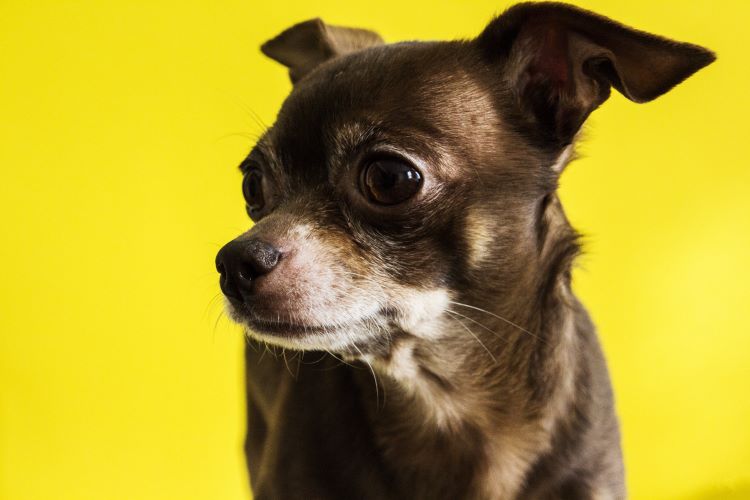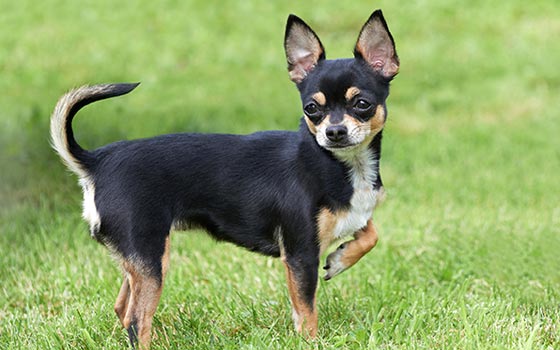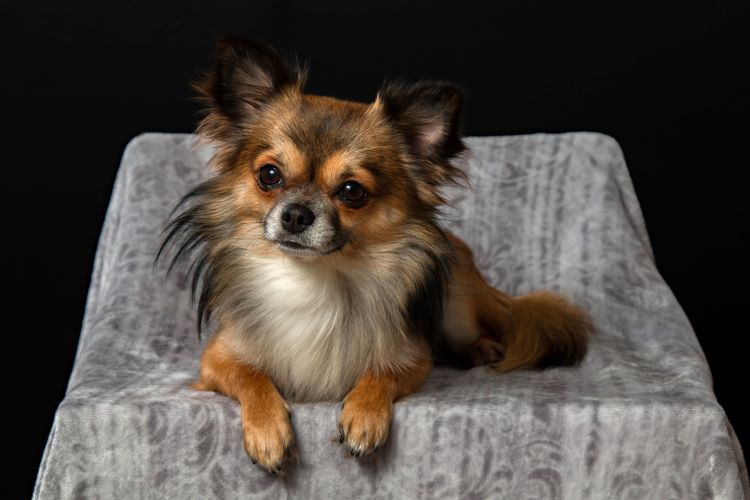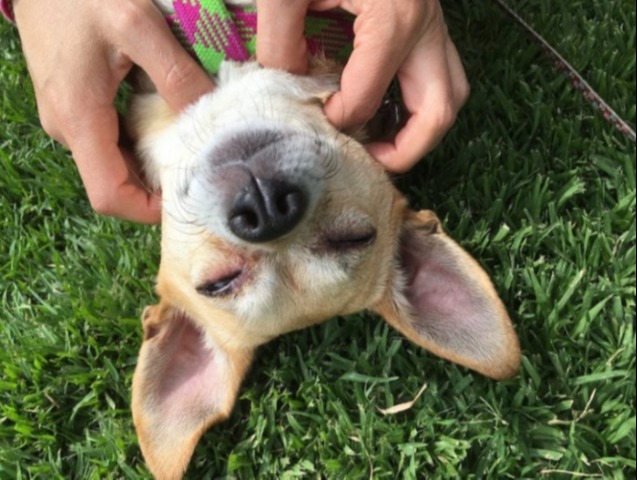Ready to help treat your pet to a healthy life?
Chihuahua Dog Breed: History, Care Tips & Fun Facts
By : Trupanion Staff | Updated Feb 6, 2024

You can probably recognize the Chihuahua easily by its small, quirky appearance. But how well do you actually know the dog breed? Whether you're considering adopting one of these fun dogs or just enjoy learning about different canines, this comprehensive guide on Chihuahuas is here to help!
Chihuahuas are tiny dogs with big attitude. They often form a strong attachment to one family member, and are fiercely protective of their chosen person. Although Chihuahuas are not as big as other breeds, they can land a nasty bite if they decide a stranger is a threat to their beloved owner. Chihuahuas tend to be intolerant of boisterous children and are often nippy, so they may not be a good choice for a family with small children.
Interesting facts about Chihuahuas
- Chihuahuas are, quite literally, an ancient breed. Their roots can be traced to the Techichi dogs kept by the Toltecs and other Mesoamerican and Native American societies. Archeologists discovered artifacts depicting these Chihuahua ancestors dated as far back as 300 B.C. and European explorers reported seeing these small dogs in reports throughout the 16th century.
- Chihuahuas are the only dog breed whose puppies are consistently born with a soft spot in their skull called the “molera,” which usually hardens by the time they are six months to one year old. Moleras are seen less often in Chihuahua mixes, toy breeds, or brachycephalic (flat-faced) puppies.
- Chihuahuas have two types of head shape. There’s the more round “apple head” or, the more slender “deer head” variation. The apple head is the standard for conformation (dog shows) in all of the major kennel clubs.
- The Chihuahua can have either long hair or short hair, or a mix.
- Chihuahuas are known for being the smallest dog breed in the world, with the Guinness World Record once being held by a Chihuahua named Heaven Sent Brandy, who measured only 6 inches long from nose to tail!
- In 2014, the Arizona town of Maryvale was taken over by feral Chihuahuas, who gained infamy for chasing people down the streets.

Get to know the Chihuahua
Like many small dog breeds, Chihuahuas have a longer life expectancy than medium and large dog breeds. While the genetics, health conditions, and lifestyle of every pup will go a long way in determining their lifespan, the average Chihuahua can be expected to reach between 14 and 18 years of age. And while genetics also play a role in each individual dog's size, the typical Chihuahua weighs between six and 10 pounds when at a healthy weight.
As part of the toy dog group, Chihuahuas are adorably petite. Their small stature sometimes has them mistaken for low-effort dogs who don't require much training or a daily routine. However, Chihuahuas can excel at dog training like other breeds and can be agile, capable companions for a wide variety of activities and adventures.
Personality
Chihuahuas have a big personality in a tiny body, and they tend to be a one-person dog. That doesn't mean that they don't do well with families. However, it's not unheard of for Chihuahuas in multi-human homes to have a noticeable favorite person. Once they fall in love with you, you’re their person! Bred as companion dogs, they love to be with their humans, resulting in the nickname “Purse Dogs” as they tend to be carried everywhere. Tiny but mighty, they won’t back down when they feel they need to protect their owner.
Similar breeds to the Chihuahua
- Papillon
- Italian Greyhound
- Chinese Crested
- Miniature Pinscher
- Xoloitzcuintli
History of the Chihuahua breed
The exact history of the Chihuahua is unknown. However, it is commonly believed that the Chihuahua’s ancestors were plentiful across what is now Mexico and the Southern United States before Europeans arrived in the Americas. Chihuahuas are believed to be descendants of the Techichi dogs kept by the Toltecs, with depictions of these types of dogs found on artifacts dating as far back as 300 BC in western Mexico. After the Toltec empire collapsed in the early 12th century, the Aztecs are believed to have taken the Techichi dog and bred it smaller, closer to our modern Chihuahua. Indigenous people kept these dogs as companions, used them to keep warm, and even believed they could take away pain and illness.
When Europeans arrived in the Americas, they saw these small, nearly hairless dogs in great numbers, especially in the region of Mexico known as Chihuahua — hence the breed’s name. In the late 1800s, many tourists from the United States brought them back across the border. And that’s how another amazing dog breed established roots in America.
American history of the Chihuahua
The Chihuahua was first recognized as a breed by the American Kennel Club in 1908 when they registered a Chihuahua named “Beppie.” The Chihuahua Club of America was founded in 1923. It wasn’t until 1952 that the AKC officially separated the Chihuahua into two varieties based on coat type.
The breed gained popularity in the 1960s when many dog owners began looking for puppies that could grow to be companion dogs rather than working dogs, and the Chihuahua fit perfectly in their urban lifestyle (and often, their handbags). The Chihuahua once again grabbed the spotlight in the 1990s when Taco Bell chose a Chihuahua named Gidget to be their spokesdog, and celebrities such as Paris Hilton showed off their own Chihuahuas.

Chihuahua behavior and training
Chihuahuas are a smart and saucy breed. They work to please their owners and learn quickly. Keeping their minds engaged with training, especially when they are young puppies, builds the human-canine bond and helps prevent unwanted behavior. Enlisting the help of a dog trainer can help.
Do Chihuahuas get along with others?
- Chihuahuas need proper proactive exposure to new sights, sounds, people, dogs, and other animals as a young puppy to prevent any future fear or reactivity. Because they bond closely to one person (or a few family members), they tend to be protective and territorial when strangers approach.
- Their small size makes living with children difficult, as they can easily be injured with rough handling and don’t enjoy a lot of noise and activity. However, they will do well with children if they are socialized from puppyhood, and the children are respectful in their handling of the dog. Young children and dogs should always be supervised, and it’s helpful for a dog to have their own “safe space” where they can go when they need some quiet time.
- Chihuahuas tend to hang with their own breed, enjoying the company of other Chihuahuas more than other larger breeds. They thrive in a one-dog household where they can rule the roost. However, when properly introduced and socialized as a puppy, they can live with other animals successfully.
Trainer tip
Helping Chihuahuas feel comfortable around bigger dogs is especially important. Their outsized “tough-guy” personality can make them an easy target for larger dogs if they try to start something out of fear reactivity.
Exercise requirements
Chihuahuas may be small, but they have quite a lot of energy! Fortunately, their size makes it easy to provide them with adequate exercise, simply by walking around the home or around the block if the weather allows. Many Chihuahuas love to play with toys as well, providing another opportunity for exercise and bonding.
Their petite size means they shouldn’t be jumping from heights such as furniture or out of the car, as it’s easy for them to injure themselves. Chihuahuas can even be seriously injured in jumps or a fall from their owner’s arms. They’ll appreciate easier access to their favorite couch nesting spots with a ramp or dog stairs, and should be lifted in and out of cars and on and off furniture.
Veterinarian tip
A few extra kibbles, treats, or shared “people food” can quickly add up to obesity-inducing calories, which causes discomfort, health issues, and a shorter lifespan. Avoid a chunky Chihuahua to help them live a long and happy life! If you're concerned about your pet's weight, talking with your veterinarian is a great first step.
Mental enrichment
Mental enrichment is important for Chihuahuas, helping to keep them entertained and prevent unwanted behaviors. Keep their brain sharp by teaching new tricks, attending obedience classes, joining a dog sport, and providing dog puzzles and interactive toys. These activities are a great outlet for your Chihuahua puppy's energy.
Common behavioral issues
The Chihuahuas’ small size can lead to feelings of vulnerability or fear. As a result, they often learn to lash out defensively when they feel threatened. This can be prevented by working on gentle handling techniques when they are puppies and providing positive exposure training through introductions to a variety of people, animals, and environments that might be otherwise scary to such a small dog.
Chihuahuas are often described as “yappy” dogs — and they can bark a lot! To avoid potential problems, they simply need to be taught what to do instead of barking (being quiet, or a nice sit-stay) when someone, for example, comes to the door. Their sharp intellect makes this type of training fairly easy. Though some owners don’t initially see the need for training a small dog, all dogs benefit from training programs and practices to help build good habits and establish bonds with their human. Positive reinforcement training is crucial for a well-adjusted and happy Chihuahua!
Trainer tip
Inappropriate and aggressive behaviors such as nipping, biting, or resource guarding by Chihuahuas are often seen as “cute” because they don’t cause serious injury as a larger dog would. However, a dog displaying aggressive behaviors is usually doing so out of fear or insecurity. For the overall well-being of a Chihuahua (and everyone’s safety!), it's important that they aren’t forced to display these behaviors in an effort to be “cute” or “go viral” on social media. Responsible Chihuahua owners will help their dogs feel safe and teach them appropriate behaviors, using proper management and positive reinforcement methods.
Activities for Chihuahuas
Chihuahuas do well in size-appropriate activities:
- Small Dog Agility
- Trick Training
- Canine Freestyle
- Rally Obedience
Chihuahua grooming and care
Chihuahuas come in two coat types: Smooth and Long. A smooth-coated Chihuahua actually tends to shed more than the long-coat, who tend to shed only seasonally. The long-coat Chihuahua has a flat or wavy topcoat and a softer undercoat, along with fringed ears, plumed tail, and fur “furnishings” on their feet and back of their legs that only require simple trimming, if any. Some smooth-coated Chihuahuas even have a double-coat, with a soft, insulating undercoat, while other smooth-coats only have a single layer of fur — making them more susceptible to cold temperatures.
Smooth-coat Chihuahuas need weekly brushing and regular baths to keep the coat shiny and healthy, and to manage shedding.
Long-coat Chihuahuas also need weekly brushing and regular baths to ensure the longer coat stays soft and shiny. The “furnishings” of the legs and feet usually don’t need professional grooming. But some owners choose to trim or neaten up the feathers on the back of their legs.
Introduce your Chihuahua puppy to the grooming experience from a young age to create a positive association and make future grooming easier and less stressful for all.
Best Brush for Chihuahuas: Bristle brush (for smooth coats), Pin brush & Slicker brush (for long coats)

Chihuahuas in pop culture
Small, spunky, and easily to move when needed, Chihuahuas are no stranger to movies, TV, commercials, and the arms of celebrities.
Famous owners of the Chihuahua
- Christina Ricci (Actress)
- Paula Abdul (Singer/Reality Judge)
- Reese Witherspoon (Actress)
- Brian Littrell (Singer)
- Jamie Lee Curtis (Actress)
- Mickey Rourke (Actor)
- Madonna (Singer/Actress)
- George Lopez (Comedian/Actor)
- Marilyn Monroe (Actress)
Famous Chihuahuas
- Gidget, the Taco Bell chihuahua
- Moonie from Legally Blonde (Gidget’s brother!)
- Paris Hilton’s chihuahuas Tinkerbell and Pixie
Chihuahuas in Movies and TV
- Beverly Hills Chihuahua
- Ren Höek from Ren & Stimpy
- Tito in Oliver & Company
